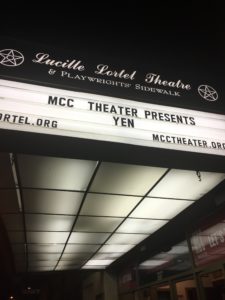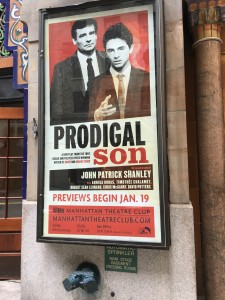http://www.playbill.com/article/lynn-nottage-is-developing-a-companion-piece-to-her-play-sweat
Tag Archives: New Play
http://www.newyorker.com/magazine/2017/03/27/the-first-theatrical-landmark-of-the-trump-era
http://www.signaturetheatre.org/News/New-Signature-Playwrights.aspx
Broadway Gets Treated to One More August Wilson Premiere
It comes something as a shock that August Wilson’s Jitney has just now made it to Broadway. The play has a complicated history first premiering in 1982 at the Allegheny Rep and, then after extensive rewrites, at the Pittsburgh Public Theater in 1996. It did not make it to New York until 2000 with a production at Second Stage. Congratulations to the Manhattan Theatre Club for bringing it to the Great White Way.
Though a part of the Pittsburgh Cycle, it is not as fully a realized piece in a socio-political sense as, say, The Piano Lesson (which is perhaps the jewel in the crown of the cycle). Further, the concluding two scenes feel rushed. Nonetheless, the play has many pleasures and shares with Fences a strong foundation of American theatrical realism.
The greatest gift Jitney offers is the final scene of Act One. Wow. Booster (Brandon J. Dirden) has just been released from prison, where he had been incarcerated for murder. After twenty years, there is a reunion between him and his father Becker (John Douglas Thompson). And they go at, tearing into each other, each blaming the other for the death (apparently passive suicide) of Booster’s mother. Recrimination builds upon recrimination. Hurt builds upon hurt. A bitter history of a family is encapsulated in the space of fifteen minutes. Hegel said that tragedy is the opposition of two rights; that is played out here in two great howls of pain. It is brutal, glorious, devastating, honest at the most fundamental human level. It is achieves the heights of O’Neill at his best. (At intermission, I kept flashing back to the Roundabout’s production of A Long Day’s Journey into Night).
Dirden and Thompson give as startling and unvarnished performance as any that can be found on Broadway right now. Other performances captivate as well. André Holland, who did a lot with his few minutes of screen time as Andrew Young in Selma, captures the weariness and hope of Vietnam veteran Youngblood. Michael Potts make the most of the complicated Turnbo – a blowhard, but not without positive qualities – and Keith Randolph Smith invests his Doub with equal measures of humor and wisdom. Director Ruben Santiago-Hudson keeps the direction of the two-hander scenes – the heart and soul of the play – crisp and energized. This was an ensemble cast that listened.
Jitney occupies an unusual place in the cycle as does the 1970’s in African-American history. It is kind of a pause between the Civil Rights Movement (and the decades leading up to that movement) and the paradox of the 1980’s and beyond. The world is shifting beyond the characters are not sure what it is shifting to, and that creates an air of uncertainty for characters and audience alike. The city wants to close down the jitney station for rezoning purposes, but what does this mean exactly. It feels a bit like complaining about Shakespeare’s use of pirates as a deus ex machina in Hamlet, but Wilson himself seems unsure here. Becker’s promise to fight city hall dissipates quickly because of his death due to an industrial accident. The concluding moment where the torch is passed to Booster feels unearned. It is the uncertainty a flaw or a design? It is not clear. Nonetheless, Jitney earns its place in the canon. Like the best American plays, it dramatizes in no uncertain terms the searing pain and heartache of family.
Who, or What, is John?
I saw Annie Baker’s John at the Arden Theater in Philadelphia on my 50th birthday. This was perhaps not the best choice as the play, deep in Joseph Campbell territory, trades in the primordial forces lurking just beyond the veneer of civilization. It is The Bacchae kept at bay, a Lovecraft story except not, a connection with a past both unexplained and inexplicable.
The Arden production, overseen by director Matthew Decker, gets the creep just right. This is not as easy as it may first seem because the play also interweaves elements of a yuppie relationship gone sour story coupled with a fish-out-water story. Jenny (Jing Xu) and Elias (Kevin Meehan) check into a Gettysburg B&B run by Mertis (Nancy Boykin). The set-up here is that this dysfunctional city couple – that can neither quite stay together not can quite break up – will receive salt-of-the-wisdom from the good country folk and find some sort of happy medium in their relationship. That by play’s end they are as dysfunctional if not more so as the play began is one example of Baker’s strengths in playing with expectations and genre.
The real pleasure of the play, though, is how it touches on the elemental of earth, humanity, and life itself. The operative word here is “touches”, almost like a cold breeze on the back of the neck. Nothing is explicit or overwhelming, but one always feels that there is something sinister just beyond the forced cheer of the B&B’s décor. The history of the house (a make-shift field hospital during the famous battle), the utilization of birds and dolls (totems) as compelling images, the strange language Mertis and her friend Genevieve speak, and the sense of female power that harkens back to Maenads of legend places the orderly world we perceive on very shaky ground indeed.
MVP Carla Belver portrays the role of Genevieve, originally assayed by Lois Smith at the Signature Theater’s production in New York City. Though Genevieve has the shortest stage time of any of four characters, she is the thematic glue that holds the play together. Belver admirably keeps the audience guessing about Genevieve. Is she touched? By mental illness or the supernatural? We simply do not know. Her monologue concerning her descent into madness and the power of her husband John over here captivates. That a John also crops up in Jenny’s life just deepens the mystery. Not who is John but what? That this question – like so many in the play – is left unanswered may be initially frustrating, but should ultimately be satisfied as the play’s very structure becomes a part of the cosmic uncertainty it is dramatizing.
Baker’s work is very challenging requiring precision and complex engagement from cast and director alike. I was heartened to see that her play survives and thrives beyond its initial production.
Yen is a Play of Tragic Devastation
I have a confession to make. I have a weakness for British social realism plays. Give me council housing, East London accents, over-consumption of Tango and Smirnoff Ice, and I’m in Heaven.
Anna Jordan’s Yen – currently playing at Lucille Lortel and produced by MCC – fits perfectly in my wheelhouse. Like all such plays that share DNA with John Osborne’s Look Back in Anger, Yen chronicles the hard poverty that a not insignificant percentage of Britain’s urban population. What sets it apart, though, is a that it is just a socio-economic investigation but a moral indictment as well.
Teenager half-brothers Hench (Lucas Hedges of Manchester on the Sea) and Bobbie (Justice Smith from The Get Down) live alone in a desolate flat with only one t-shirt to share between them. They take care of – in the loosest sense of the term – Taliban, their German shepherd. Their mother Maggie (Ari Graynor) has buggered off to live with a new boyfriend. Into their lives wanders Jennifer, or Yen (Stefanie LaVie Owen), newly arrived from Wales. She tries to bring care and human affection to the boys and the dog. At first, she seems to have a positive effect on their lives, but inevitably it all goes terribly wrong and damaged people become even more (physically and emotionally) damaged.
Jordan’s work is unique for several reasons. First, sudden care after years of, well, not abuse necessarily but certainly neglect does not automatically create a positive trajectory toward reassimiliation into society. It is just as likely to create divisions, misunderstandings, and even rage. Second, both brothers are troubled to some degree or another, though Bobbie more so. They do not have the language to express their state of being. Even as Bobbie gets swept up by the Crown’s judicial system, Hench is still left hanging without a clear path to something, anything better. When he seeks out Yen at the end of the play, after all the pain she has had to endure, he desperately needs to tell her something. In an American play, this would result in a beautiful monologue where the damaged hero would tell a story that would crystallize his self-awareness and lead him down the road of recovery and redemption. Not so here. His monologue is a tangle of words and images that distills nothing. Brilliant. Third, Maggie realizes that she has failed as a mother as she sits with Bobbie at the end of the play, but in the same moment, she also realizes that she does not possess the tools to be a better mother. Progress perhaps, but only measured in millimeters.
And that leads to the new terrain Jordan treads. Yes, conditions in council housing, or projects, are bad. That is easily agreed. Here is where she pierces the heart. It is already too late, she seems to be saying. For teenagers like Hench and Bobbie, they are already past saving. It is not enough to try and salvage a bad situation. It is a moral imperative not to let that bad situation occur in the first place or there will be no escape generation after generation.
The acting is exceptional. Owen is both a tough and vulnerable Yen. Graynor is both comic and tragic, monstrous and despairing in equal measure. It catches one unaware, but her journey over the course of the play is immense and organic. Smith and Hedges both play against their more famous screen personas. Smith successfully rides the roller coaster of volatile emotions and maturity. Hedges — who has been carving a niche for himself in indie film working with such directors as Wes Anderson, Terry Gilliam, and Kenneth Lonergan – proves he has the chops to be one of our country’s great actors in the Philip Seymour Hoffman/Michael Shannon vein. His silences are filled with a wounded intensity, his line readings underscored by emotional complexity, and his sense of character revelatory.
For American audiences used to closure and the conclusion of their dramas, Yen is not always easy, but ultimately that is what makes it such a rewarding and necessary evening of theatre.
Danger and Revolution: Ike Holter’s Exit Strategy
W.E.B. Du Bois once wrote, “For education among all kinds of men always has had, and always will have, an element of danger and revolution, of dissatisfaction and discontent.” That statement could serve as the epigraph of Ike Holter’s startling new drama Exit Strategy currently in previews at The Cherry Lane Theatre (co-produced by Primary Stages and the Philadelphia Theatre Company). This new work dramatizes the crisis in American education with a voice of anger tempered with compassion.

Holter is working in a similar vein to David Simon (The Wire, Treme, Show Me a Hero) in exploring the gritty reality of local politics and local corruption. The focus here is on one school on the Southside of Chicago that faces closure at the end of the school year because it is falling apart, because it has disastrous test scores, because the land is worth more than the building. At first, the faculty is bitter and resentful but ultimately passive. It takes the audacious act of a student to force them into action and to take the fight to City Hall. The resulting protest resounds with the power of the forgotten and marginalized to make those in power to take notice. Alas, like Simon, Holter eschews pollanyish endings.
Exit Strategy critiques the current socio-political state on a number of levels. First, and most obviously, there is the dissection of the indifference of City Hall to the needs of its constituents, at least its constituents who are not white or not wealthy. Second, the play serves as an expose of the current crisis in American education. There are excellent schools, just as there are excellent doctors. But if you don’t have the coin to pay for them, you are never going to receive their benefits; we can see the slow construction of a society stratified by class with the boundaries drawn by access to education. Third and finally, though, it is an attack on the indifference and apathy that seemingly infects every corner of the nation. Teachers and administrators go through the motions even though those motions are costing people their jobs, their dignity, their future.
All of which makes Exit Strategy sound didactic, which it is not. The script crackles and moves with a fleetness of foot and dark humor of individuals facing impossible odds. Essentially Holter has done what the 1980’s film Teachers was supposed to do: offer audiences a raw agitprop investigation of urban education. In this, the playwright is ably assisted by director Kip Fagan and some of the tightest ensemble acting I have seen on the New York stage in years.
Deirdre Madigan commands attention in the play’s opening scene as a teacher whose raw hostility masks a far more generous heart. Brandon J. Pierce is brings the right mixture of cockiness, anger, and immaturity to Donnie, the student who inspires the small revolution to life. Michael Cullen, Aimé Donna Kelly, Rey Lucas, and Christina Nieves occupy the spectrum of apathy and disgust that is any faculty lounge. The lynchpin is Ryan Spahn whose Ricky is the assistant principal; the various odious tasks that come down from City Hall often fall upon his shoulders. Ricky is a complicated character: an essentially nice guy with a good heart who feels that he has no choice to be the hatchet man until the scales fall from his eyes. His transformation from spineless bureaucrat to the leader of the protest is nuanced and organic. We witness a man find his own sense of moral worth. Kudos too to Holter for his decision that in making Ricky gay his sexuality became just one facet of his character not the overall defining feature of his character.
If I have one complaint about Exit Strategy it is this: it is too short. Usually it is the opposite problem, but Holter has built so much — and there journey here is long and complicated with a number of set-backs — that he needs to allow it to breathe more. Further, his characters have such interesting full lives that we want to spend more time with them. For instance, Ricky’s relationship with Rey Lucas’s Luce is rarely touched, but when it does, seems to be one of missed opportunities and two good people failing to connect and communicate with one another. Like so much else, I wish they had given more exploration. But if you left your audience wanting more, I suppose that could be classified as a good problem.
Holter’s play is ultimately a tragedy of America. Again, to quote Du Bois, “Either America will destroy ignorance or ignorance will destroy the United States.” In Exit Strategy, ignorance alas wins, but it does get a fight.
[Note: This performance this writer saw as a preview performance.]
Not Even Chlorine Can Clean Away This Corruption
Lucas Hnath has written the best play David Mamet didn’t. That assessment may initially appear to be damning with faint praise. Yet, Hnath has exceeded the reach of his predecessor in several key elements.
Currently coming to the end of it’s run at New York Theatre Workshop, Hnath’s Red Speedo details the late career hopes of professional swimmer Ray (played with off-kilter intensity by Alex Breaux). The plot revolves around whether or not he took performance-enhancing drugs to aid him for his Olympic trials. The moral quagmire encompasses Ray, his brother/manager Peter (Lucas Caleb Rooney), his coach (Peter Jay Fernandez), and ex-girlfriend Lydia (Zoë Walters). Hnath shares Mamet’s ability to bring his drama alive with staccato lines spat out like frantic machine-gun fire from Apocalypse Now. He also dramatizes the moral rot that can pervade an institution and how the appearance of propriety often becomes more important than actual propriety.
Hnath excels in some compelling ways. First, in Lydia, Hnath has created a fully realized female character. Lydia is not an idea or caricature or plot device. As embodied by Walters, Lydia — even though she appears in a single scene — is fully a part of the tapestry of the world. Her reach — the effect that she has on the narrative outcome — far greater than her stage time might at first indicate. Morally damaged like the other characters, Zoë is the one who tries to find a path — stumbling in the dark as she does — to something more ethical, something that allows her to leave her past behind.
Second, the playwright carefully weaves the personal and the professional together. Choices flow organically from character, from damaged pasts, from desperation. If a character chooses a morally questionable path, the drive emanates as much from the pains of failures, the fear of abandonment and loss, and the desire to escape errors. Greed is not so much a motive as fear. That makes them more understandable, more relatable. We can bring them closer to us, rather than judging them from the distance. Of course, once we have brought Ray into our hearts — when we think he is a jerky, somewhat stupid, somewhat deluded guy — then Hnath brings down the hammer and we are confronted by the monstrosity of Ray’s actions.
And that, finally, leads to Hnath’s greatest playwriting strength: the ability to surprise. None of the salesmen of Glengarry Glen Ross are particularly likable. We see them for what they are from the start. And when they fall upon one another in the second act, it is entertaining to be sure, but the audience is kept at a distance from them; we can happily feel morally superior to them because we are removed from them. Not so with Ray. Hnath sets his drama so that we believe Peter to be the fast-talking lawyer with the ethics of a deranged squirrel while Ray has just been along for the ride but is ultimately a sweet kid, redeemable. As the play unfolds, we see different shades of both that reveal complexity and nuance to both. The playwright carefully reveals details that leave us, at the end, with the judgment of Ray that is starkly different, starkly darker than where we started.
Director Lileanna Blain-Cruz stages the drama brilliantly, and the transformation of the New York Theatre Workshop space into the side of a swimming pool serves the work admirably. Fernandez excels as the Coach, and he lays bare the contradictions of his character as he must navigate the shoals of which moral compromises to make and which to avoid.
With Prodigal Son, Shanley is Our James Joyce
There comes a moment in James Joyce’s A Portrait of the Artist as a Young Man, when Stephen Dedalus, the author’s alter ego states, “Welcome, O life! I go to encounter for the millionth time the reality of experience and to forge in the smithy of my soul the uncreated conscience of my race.” The novel chronicles how a young man creates himself both as an individual and as an artist. As he authors himself, he walks through the fires large — nationalism, religion — and small — the struggles of adolescence, a dysfunctional family. Last month when I saw Prodigal Son, I came to the conclusion as the lights came up for the curtain call that, at last in John Patrick Shanley, we had our American Joyce.
Much can and has been said about Prodigal Son, but I want to here focus on that Joyce connection. Shanley, as with Joyce, has brought his adolescent self to life through words — through poetry and prose, through philosophy and theology — to be reconsidered, reexamined, to undergo catharsis as much for the audience as no doubt himself. His avatar, Jim, is truly a remarkable creation. And I should add that in Timothée Chalamet (famous for Homeland and Interstellar) Shanley has found the ideal collaborator. Actor and author do not shy away from Jim’s darkness — he says and does the stupid things teenagers often do as they wrestle with the twin tensions of childhood and adulthood — his brilliant narcissism, or his self-destructive impulses. He is not likable the way teenagers on television sit-coms are often likable. But he is engaging and endearing. His darkness is understandable, his pain a source of empathy, his yearning to connect with an world of ideas that he cannot yet quite touch remarkable. The play is no better than when Shanley lets Chalamet tear into a monologue, trip the light fantastic in a way that has the raw magic of stream-of-consciousness to find truths (human truths, perhaps, if not universal truths) in the most Joycean, or given the play’s setting in the 1960’s, Kerouacian way. The actor opens up to show us both the wonder and pain within.
Stanley is at his most powerful when his flawed characters wrestle with faith and doubt (in reference to his perhaps most famous work). What intrigues here for Jim is the same that intrigues for Stephen: the temptation for sin he finds within and not from without. He recognizes the darkness in himself — the darkness that dwells within all of us — but he is intelligent enough (brave enough? foolish enough?) to address it and not ignore it as most do. What will win inside him? Will what Lincoln called “the better angels of our nature” eventually hold sway? Jim does not know. He wants to find the answer, though perhaps it too scares him.
Louise, the headmaster’s wife, tells him, “I think James Quinn is a fine outline, and it’s up to you to fill it in.” Shanley, I think bravely, undertakes the return to his tumultuous past (for the nation, for himself) to try and unlock the puzzle of his earlier life. Kudos to him for not giving us pat answers — for still not truly knowing what the answers are yet, though he surely has a better grasp of the questions.
Shanley, for me, became the American Joyce the day he decided to put Prodigal Son on stage. Here is the kicker. I do not believe he set out to do that. If he had, his work would have been derivative, pretentious, blah. He just sat out to write the most searingly honest play he could. In so doing, he stumbled onto something unintended and rare: a work uniquely specific and uniquely universal. Joyce writes of Stephen, “He did not want to play. He wanted to meet in the real world the unsubstantial image which his soul so constantly beheld. He did not know where to seek it or how, but a premonition which led him on told him that this image would, without any overt act of his, encounter him.” Shapely could write the same of Jim.



